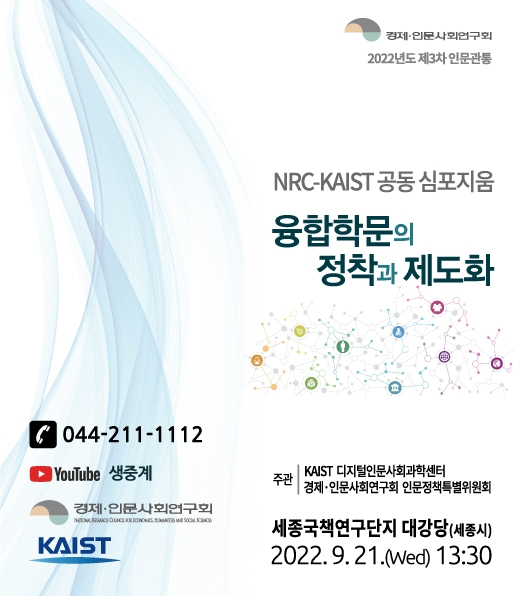In an attempt to foster “global creative convergent leaders”, the Korean society has sought various methods for convergence education and research from different angles. KAIST has also identified with this societal trend. On September 21, the School of Digital Humanities and Computational Social Sciences (DHCSS) co-hosted a symposium with the National Research Council on the “Establishment and Institutionalization of Convergence Studies” at the auditorium of the National Research Complex in Sejong City.

The conference was organized to review the achievements and shortcomings of the current academic system with regards to the integration of different disciplines and to discuss the direction of future humanities, social, and scientific convergence studies. The meeting was composed of two sessions. The first session focused on the sharing of perspectives and opinions from people in academia on convergence studies taught in universities, while a more extensive discussion on possible academic systems that can improve the current convergence talent education was carried out in the second session.
The director of the DHCSS and other KAIST professors delivered welcoming speeches, and Honorary Professor Kwangyun Whon, the former chairman of the National Science and Technology Research Association, gave a keynote lecture on “Homo Digitalis: What Will the Digital Revolution Do to Us?” in the first session. In the second session, Jungin Kim, the Chairperson of the Special Committee on Humanities Policy under the Economic, Humanities and Social Research Council, conducted a discussion on the establishment of convergence education for the digital leaders of the future. Three professors from KAIST and one professor from Ajou University participated as panelists. Throughout the discussion, they pointed out that convergence education and research should be established naturally — people studying in different fields should gather when confronted with a common problem to contribute their specialized academic knowledge. Additionally, they remarked that teaching students exactly what students in different departments learn cannot effectively induce convergence education. Students have to find and learn aspects or knowledge from other fields that are applicable to their own academic fields.
Although various problems have been raised in this symposium, detailed plans on how to induce convergence studies have to be further addressed. Jungin Kim hence looks forward to hosting another joint symposium with KAIST to discuss how policies and performance evaluation criteria should change. The date of the next symposium is yet to be decided.

